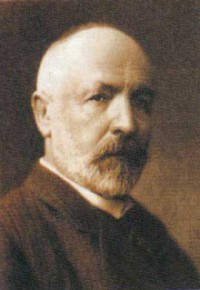The concept of infinity was first introduced by the ancient Greeks. However, infinity was difficult for them to wrap their minds around. One of the
first major references to infinity was provided by Zeno of Elea.
 In the fifth century B.C., Zeno introduced a series of paradoxes; you may have heard
of some of them. One particularly famous paradox concerned Achilles in a foot race with a tortoise. In this paradox, Achilles gives the tortoise a
head start and they race! As the racers start, once Achilles reaches where the tortoise started, the tortoise has already made a bit of progress. Next,
Achilles runs to the point where the tortoise had just reached and alas, the tortoise has made another bit of progress! The idea here is that the process
can repeat over, and over, and over again and Achilles will never reach the tortoise. This paradox introduced the idea, later discussed by Aristotle,
of a 'potential' infinity
(Click here to see an interactive applet demonstrating this paradox).
In the fifth century B.C., Zeno introduced a series of paradoxes; you may have heard
of some of them. One particularly famous paradox concerned Achilles in a foot race with a tortoise. In this paradox, Achilles gives the tortoise a
head start and they race! As the racers start, once Achilles reaches where the tortoise started, the tortoise has already made a bit of progress. Next,
Achilles runs to the point where the tortoise had just reached and alas, the tortoise has made another bit of progress! The idea here is that the process
can repeat over, and over, and over again and Achilles will never reach the tortoise. This paradox introduced the idea, later discussed by Aristotle,
of a 'potential' infinity
(Click here to see an interactive applet demonstrating this paradox).
Potential Infinity is the idea that something is infinite in the sense that the infinity is never actually 'achieved,' but is represented by a process or pattern that seemingly never ends. For example, an infinite series (e.g. 1 + .5 + .25 + .125 + ...) would be considered a potential infinity, due to the fact that there is no final element in the series. You just keep adding on numbers. Another simple example might be the Natural numbers (1, 2, 3, 4, 5, ...). The Natural numbers are potentially infinite because there is no 'largest' Natural number. Any really large number you think of, you can always add 1 and get a slightly larger number. This was one of the main examples Aristotle provided of potential infinity. In further study, Aristotle said that there are two types of infinity: potential and actual infinity. Potential infinity is described by some of the examples I have shown here, as an infinity that can never actually be achieved. He didn't have much insight into the actual infinity. This is where things start to get interesting.
Perhaps the field of mathematics that relies on infinity the most is Calculus. The discovery of Calculus has been primarily attributed to Isaac Newton and Gottfried Wilhelm Leibniz: Newton born in 1643 and Leibniz born in 1646. Many other mathematicians before and after Newton and Leibniz contributed to different elements of Calculus, but these two contributed perhaps the most important elements. Regarding infinity, one of Newton's major contributions to Calculus was the idea of Power Series. A Power Series is an infinite series of polynomial equations, or in other words an equation of the following form: $$\sum_{n=0}^{\infty}c_n(x-a)^n$$ These series have important application that will be addressed later on.
On the subject of infinity once again, one of the most important notions Leibniz contributed to Calculus was the following: he viewed a "curve as a polygon with infinitely many sides, each of infinitesimal length" (Kleiner). Viewing mathematical curves in this away allowed for application of the derivative and the integral, which we will also address in greater detail later.

One of the most important contributors to the idea of infinity was Georg Ferdinand Ludwig Philipp Cantor (Better known as simply Georg Cantor). Cantor was born March 3rd, 1845 in St. Petersburg Russia, but not much is known about his early life. His family moved to Germany in 1856 where after not too long, he started in on his studies of mathematics. He went on to attend University of Halle and at the age of 34 became a professor at that same university. Cantor focused a good deal of his time in the area of Number Theory, which led to his work with infinity: particularly the 'actual' infinity.
There was reference made earlier to the difference between 'potential' and 'actual' infinity proposed by Aristotle. We discussed Aristotle's explanation of the Natural numbers as an example of potential infinity. However Cantor explained that, in looking at the Natural numbers as a set of elements, that set would be considered an actual infinity. This idea sparked the mathematical study of set theory and pushed Cantor to further develop the idea of infinity and it's applications (which we will discuss in greater detail later). Cantor is perhaps most well known for his contributions to set theory and the development of infinity.
In further sections, we will discuss some of the important mathematics behind infinity, as well as it's practical application.
